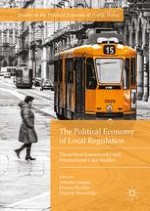2017 | OriginalPaper | Chapter
Researching the Political Economy of Regulation at the Local Level: Theoretical and Methodological Issues
Author : Alberto Asquer
Published in: The Political Economy of Local Regulation
Publisher: Palgrave Macmillan UK
Activate our intelligent search to find suitable subject content or patents.
Select sections of text to find matching patents with Artificial Intelligence. powered by
Select sections of text to find additional relevant content using AI-assisted search. powered by
